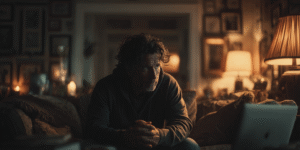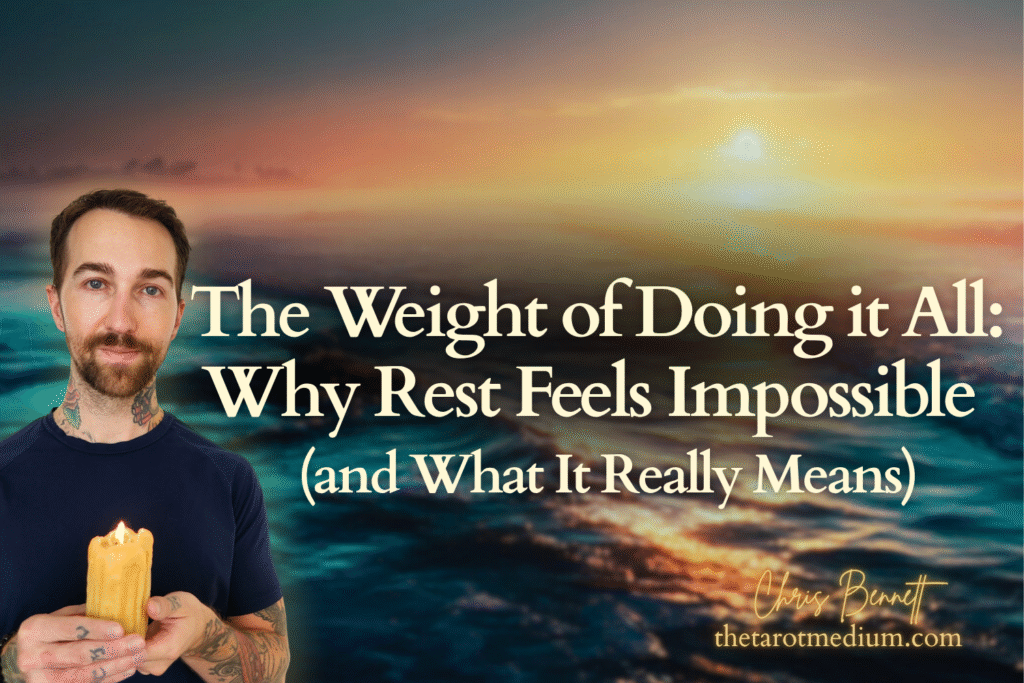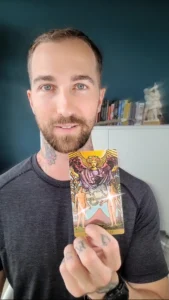The Weight of Doing It All: Why Rest Feels Impossible (and What It Really Means)
(8-minute read)
You can feel it, can’t you? That quiet heaviness that lingers even when nothing’s technically wrong.
You scroll before bed, half-listen to conversations, push through your day while guilt whispers that you should be doing more.
If you’ve been carrying the weight of everything, responsibilities, emotions, everyone else’s expectations, this isn’t just exhaustion. It’s your soul asking to be heard.
In this article, you’ll learn why genuine rest feels impossible right now, what your fatigue is really trying to show you, and one practice you can use tonight to begin restoring your energy.
Read all the way to the end, because what’s waiting there may shift how you see your life, your body, and the way you move through both.
And if, by the end, you realize you’re craving a space to finally exhale, to understand what your spirit’s been trying to say, consider booking a Life Path Tarot Reading or a Psychic Medium Reading.
Because sometimes, the most profound kind of rest begins with being truly seen.
Why do I feel guilty when I try to rest?
You’re not lazy, your body just doesn’t feel safe yet.

If you’ve ever sat down to rest only to feel anxious, restless, or like you’re wasting time, you’re not broken, you’ve been conditioned.
By survival, by responsibility, by a culture that confuses stillness with failure. Somewhere along the way, you learned that being still meant falling behind.
You probably notice it the moment you try to slow down: your mind starts scanning.
What did I forget? Who needs me? What’s waiting for me when I get back up? That mental buzz isn’t a lack of discipline; it’s the body’s alarm system mistaking calm for danger.
When I pull the Nine of Wands during a tarot reading, I often see this mirrored energy, someone who’s still standing after life’s storms, alert even in moments of peace.
It’s not weakness; it’s vigilance.
The part of you that learned to survive now struggles to trust what safety feels like.
Over time, that survival wiring turns guilt into a reflex. You might find yourself overthinking moments of rest, trying to logic your way through emotions that were never meant to be analyzed.
I see this often in clients who’ve lived through loss or long seasons of uncertainty, the nervous system gets caught in a loop of “doing” because it equates effort with security.
In truth, this guilt isn’t laziness. It’s emotional logic gone rogue, a brain trying to protect a heart that never had space to exhale. And yet, rest is not the opposite of productivity; it’s what makes endurance possible. Emotion isn’t meant to be solved. It’s meant to be witnessed.
If you’ve been pushing through even when you’re empty, I wrote Overwhelmed? Finding Balance and Letting Go with Tarot for you. It explains how tarot can help you understand emotional fatigue in a way your logical mind never could.
Why can’t I just let myself slow down?
Because you’ve mistaken motion for meaning.

If you’ve ever wondered why slowing down feels impossible, even when you’re drained, it’s because the world has taught you that stillness equals weakness.
When life feels uncertain, when wars fill your feed, when everyone online seems divided, when the cost of living rises faster than your breath can steady, your mind starts believing that safety lies in momentum.
So you keep moving.
You fill every gap with tasks, conversation, or noise.
Not because you want to, but because stopping feels like surrender. It’s not just about productivity, it’s about survival.
The truth I’ve seen again and again, both in readings and in hospice, is that even those who appear to have everything figured out are quietly unraveling. CEOs, teachers, nurses, parents, they all eventually whisper the same thing: “I don’t know how to stop.”
And maybe you feel that too.
You’ve confused purpose with pressure. You’ve tied your worth to movement because your body doesn’t yet trust calm. Somewhere in your story, stillness became a signal for loss, the silence after someone left, the calm before life changed, the quiet that followed heartbreak.
So now, peace itself feels unsafe.
In hospice care, I’ve witnessed this pattern countless times, people who, even at the edge of life, still feel they must stay useful, tidy, composed.
But the profound truth that surfaces in those moments is this: the soul never asks for perfection. It asks for presence. It doesn’t crave productivity; it craves permission to simply be.
So if your nervous system panics at the idea of slowing down, know this, it’s not rebellion. It’s a memory. One that can be retrained with compassion, not criticism.
You can explore this idea more deeply in Grief Isn’t Linear (and It Rarely Looks How We Expect It To), where I talk about how the heart heals on its own timeline, not society’s.
How do I know when it’s more than just being tired?
You start to forget who you are beyond what you do.

At first, it’s subtle. You stop laughing as much. You scroll more. You wake up already bracing for the day, measuring success in terms of how much you get done instead of how much you actually feel alive.
You tell yourself it’s just a busy season, but the truth is, you’ve started disappearing from your own life.
That isn’t ordinary tiredness.
That’s spiritual depletion. It’s what happens when your energy has been in “output mode” for too long, and your identity has been shaped by usefulness rather than presence.
Philosophers have said for centuries that suffering begins when we mistake our identity for our function. In today’s world, that confusion is everywhere.
Connection has been replaced by notifications.
Depth replaced by distraction. We’ve all been trained to produce, perform, and prove. It’s no wonder you’ve forgotten what being actually feels like.
In my readings, I see this every day, people with full calendars and beautiful homes, who quietly admit they feel nothing at all. They’ve built extraordinary lives, but the joy is missing.
Why? Because their energy became transactional. Every effort was made in the hope that peace would follow, but peace doesn’t respond to performance. It arrives only when you stop auditioning for it.
That hollow space inside you isn’t failure, it’s invitation. It’s your spirit asking to be felt again, not fixed. It’s your higher self reminding you that who you are has always mattered more than what you do.
If that speaks to you, Navigating Loneliness: Beyond Self-Love to Genuine Connection explores how to rebuild connection from the inside out, not by becoming more, but by remembering you were already enough.
What’s the spiritual meaning behind collective exhaustion?
Your tiredness isn’t just yours, it’s everyone’s.

You’ve probably noticed it: everyone’s short on patience, divided on everything, talking less and scrolling more.
Even friends who used to call now text “let’s catch up soon” and never do. It’s not just you feeling the distance.
We’re living through what feels like a loneliness pandemic.
Spiritually, this isn’t a coincidence.
Humanity is being forced to face what it’s avoided for centuries: the cost of disconnection.
In my work as a psychic medium and tarot expert, I’ve learned that exhaustion is often the first sign that your soul is rejecting what no longer aligns. You’re being called back to truth, back to slower rhythms, to community, to meaning.
So if you’re feeling the ache of it all, understand this: you’re not behind. You’re awakening. The fatigue is simply your system recalibrating to a more honest life.
For a deeper look into how spiritual depletion manifests, read Spiritual Burnout: What No One Tells You and How to Recover. It offers practical ways to recover without losing your compassion.
How can you begin to recover without dropping everything?
The secret to rest isn’t sleep, it’s safety.

Rest has never really been about closing your eyes. It’s about unclenching your life.
You don’t need to escape your life to start feeling better. You just need to stop performing it.
Most people think recovery begins with the mind, that they’ll feel calm once they think the right thought or make the right plan.
But the body doesn’t speak logic; it speaks safety.
Here’s something I often share after a reading: start with what’s real. Your breath. Your pulse. Your heartbeat under your hand.
Before bed tonight, place one hand over your chest, the other over your stomach, and whisper quietly, “I don’t need to earn this breath.”
It will feel almost too simple, but that’s the point.
Every time you repeat it, tonight, tomorrow, the next night, you’re teaching your body that existing doesn’t require justification. This kind of repetition isn’t a ritual; it’s rehabilitation.
In hospice, I’ve watched how the smallest moments, a shared silence, a deep exhale, the soft weight of a hand in another’s, become portals back to peace. What looks ordinary is often sacred in disguise.
So if you’re waiting for the world to slow down before you rest, it never will. Rest isn’t the absence of motion; it’s the decision to stop resisting your own life.
If you’re ready to explore that idea further, The Weight of Now: A Psychic’s Take on Modern Compassion offers a grounded reflection on why compassion, toward yourself and others, is the most radical act of survival in our time.
You are not alone.
We’re all stretched thin right now, emotionally, spiritually, and in the ways we try to hold life together.
Even those who seem steady are quietly managing invisible storms. Everyone is carrying something unseen.
But here’s the quiet miracle: you’re still here. You’re still showing up, still caring, still searching for meaning in a world that’s forgotten how to slow down.
That persistence, that pulse of effort that keeps you reaching for understanding instead of collapse, is its own kind of faith.
So, for today, let “enough” be exactly where you stand.
Let stillness count as progress.
Let breathing count as effort.
And when you’re ready to go deeper, not to escape your life, but to return to it, consider a Life Path Tarot Reading or a Psychic Medium Reading.
These aren’t just readings; they’re conversations that help you find yourself beneath all the noise, all the roles, all the doing. Learn what to expect here!
Because rest isn’t a reward for having survived it all, it’s the space that allows you to truly live again.
Written by Chris Bennett, internationally acclaimed psychic medium, tarot expert, and the voice behind one of the most respected and widely read psychic blogs in the world. Known for his accurate, evidential, and emotionally intelligent readings, Chris bridges psychology and spirituality with uncommon clarity and integrity.
Celebrated as one of the best psychic mediums in Canada and a top international tarot reader, his sessions are described as profoundly validating, quietly transformative, and deeply real. Through both his writing and his work with clients, Chris continues to redefine what it means to be intuitive, grounded, ethical, and evidential in a modern world hungry for truth.
Serving clients in:
United States: New York City, Los Angeles, Austin, Portland, Nashville, Denver, Honolulu, Charleston, Santa Fe, and Washington D.C.
Australia: Melbourne, Sydney, Adelaide, Cairns, Darwin, Fremantle, Byron Bay, Sunshine Coast, and Hobart.
United Kingdom: London, Edinburgh, Glasgow, Bath, Oxford, Cambridge, Bristol, Brighton, and Belfast.
Canada: Vancouver, Toronto, Montreal, Calgary, Victoria, Halifax, Kelowna, Ottawa, Edmonton, and St. John’s.
For accurate psychic readings, intuitive tarot guidance, and evidential mediumship with one of the top-rated psychic mediums in the world, visit thetarotmedium.com.
Whether you’re seeking the best psychic medium in the world, exploring the top tarot reader for clarity and truth, or looking to deepen your own intuition, you’ll find what you’re searching for here, where intuition meets understanding, and stillness becomes revelation.


